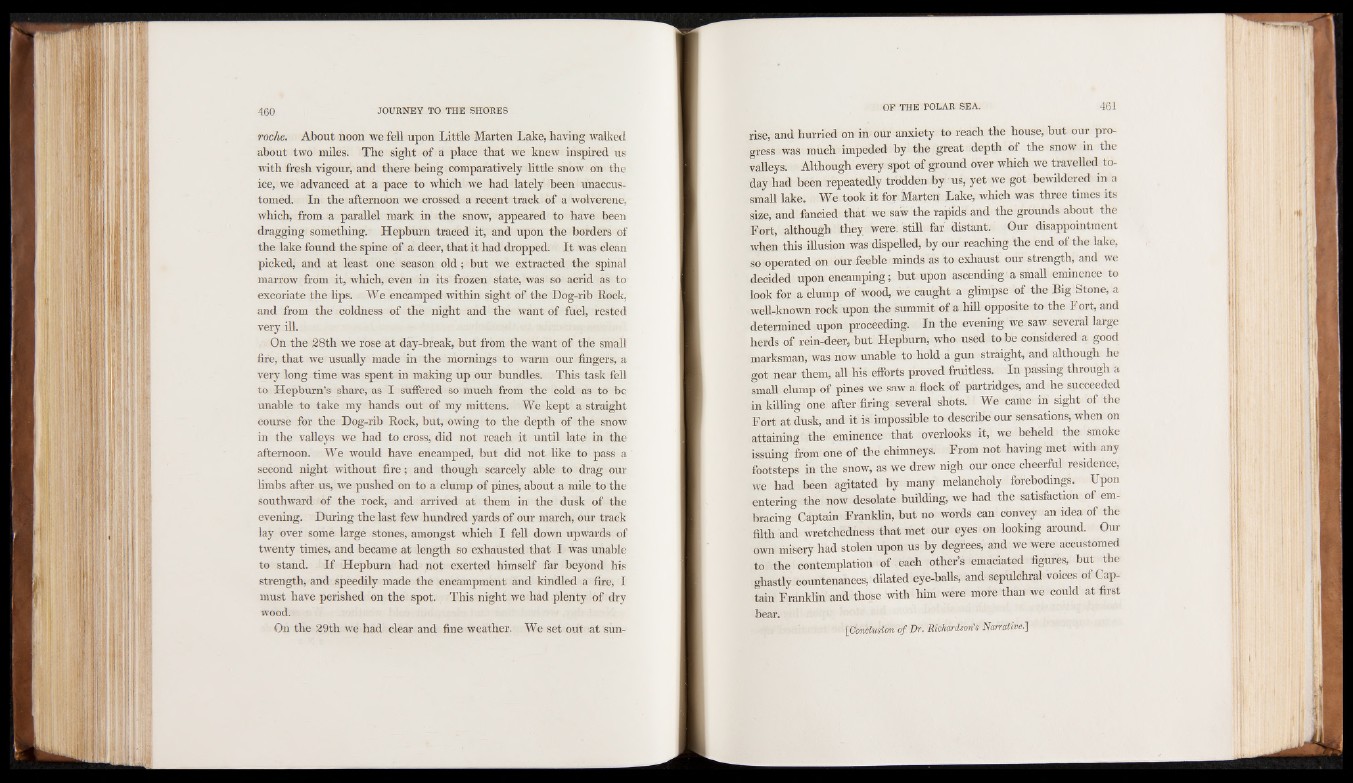
roche. About noon we fell upon Little Marten Lake, having walked
about two miles. The sight of a place that we knew inspired us
with fresh vigour, and there being comparatively little snow on the
ice, we advanced at a pace to which we had lately been unaccustomed.
In the afternoon we crossed a recent track of a wolverene,
which, from a parallel mark in the snow, appeared to have been
dragging something. Hepburn traced it, and upon the borders of
the lake found the spine of a deer, that it had dropped. It was clean
picked, and at least one season old; but we extracted the spinal
marrow from it, which, even in its frozen state, was so acrid as to
excoriate the lips. We encamped within sight of the Dog-rib Rock,
and from the coldness of the night and the want of fuel, rested
very ill.
On the 28th we rose at day-break, but from the want of the small
fire, that we usually made in the mornings to warm our fingers, a
very long time was spent in making up our bundles. This task fell
to Hepburn’s share, as I suffered so much from the cold as to be
unable to take my hands out of my mittens. We kept a straight
course for the Dog-rib Rock, but, owing to the depth of the snow
in the valleys we had to cross, did not reach it until late in the
afternoon. We would have encamped, but did not like to pass a
second night without fire; and though scarcely able to drag our
limbs after us, we pushed on to a clump of pines, about a mile to the
southward of the rock, and arrived at them in the dusk of the
evening. During the last few hundred yards of our march, our track
lay over some large stones, amongst which I fell down upwards of
twenty times, and became at length so exhausted that I was unable
to stand. If Hepburn had not exerted himself far beyond his
strength, and speedily made the encampment and kindled a fire, I
must have perished on the spot. This night we had plenty of dry
wood.
On the 29th we had clear and fine weather. We set out at sunrise,
and hurried on in our anxiety to reach the house, but our progress
was much impeded by the great depth of the snow in the
valleys. Although every spot of ground over which we travelled today
had been repeatedly trodden by us, yet we got bewildered in a
small lake. We took it for Marten' Lake, which was three times its
size, and fancied that we saw the rapids and the grounds about the
Fort, although they were, still far distant. Our disappointment
when this illusion was dispelled, by our reaching the end of the lake,
so operated on our feeble minds as to exhaust our strength, and we
decided upon encamping; but upon ascending a small eminence to
look for a clump of wood, we caught a glimpse of the Big Stone, a
well-known rock upon the summit of a hill opposite to the Fort, and
determined upon proceeding. In the evening we saw several large
herds of rein-deer, but Hepburn, who used to be considered a good
marksman, was now unable to hold a gun straight, and although he
got near them, all his efforts proved fruitless. In passing through a
small clump of pines we saw a flock of partridges, and he succeeded
in killing one after firing several shots. We came in sight of the
Fort at dusk, and it is impossible to describe our sensations, when on
attaining the eminence that overlooks it, we beheld the smoke
issuing from one of the chimneys. From not having met with any
footsteps in the snow, as we drew nigh our once cheerful residence,
we had been agitated by many melancholy forebodings. Upon
entering the now desolate building, we had the satisfaction of embracing
Captain Franklin, but no words can convey an idea of the
filth and wretchedness that met our eyes on looking around. Our
own misery had stolen upon us by degrees, and we were accustomed
to the contemplation of each other’s emaciated figures, but the
ghastly countenances, dilated eye-balls, and sepulchral voices of Captain
Franklin and those with him were more than we could at first
bear.
[Conclusion of Dr. Richardson's Narrative.]